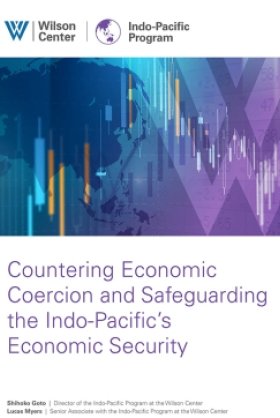Countering Economic Coercion and Safeguarding the Indo-Pacific's Economic Security


The need to take economic interests into consideration in shaping national security is no longer in question. There is substantial alignment between the United States and Japan in prioritizing economic security considerations. Both countries share concerns, not only about protecting their economic advantages, but especially when it comes to defending their dominance on the technological front.
At the same time, the two countries are in alignment in acknowledging the risks of excessive dependence on China not only as a market, but also as a source of supplies vital for economic growth. The People’s Republic of China (PRC) has not hesitated to leverage its economic dominance for political gain in the form of coercion. No country has been too large or too small to come under the attack of Chinese efforts to weaponize its economic hegemony. Wariness about China’s weaponization of its economic strength is where like-minded countries see eye-to-eye.
There is a consensus in Washington and Tokyo that minimizing overreliance upon the PRC is a critical part of enhancing the economic security landscape bilaterally and across the region. As such, the United States and Japan should expand and accelerate efforts to update and reform the rules-based order into one that provides an attractive, alternative economic bloc to China for countries throughout the Indo-Pacific.
That said, there is no shortage of policy issues erecting barriers to this vision. While the PRC serves as the driving factor behind US-Japan bilateral economic cooperation, Washington and Tokyo are not in complete agreement in assessing the threat posed by China on their respective economic security circumstances. Indeed, differing levels of willingness to confront the PRC means that a NATO-style collective economic security response to Chinese coercion is off the table. The issue of how tall of a fence and how narrow of a yard to pursue are high priorities for consideration by the allied governments.
This report explores PRC economic coercion, provides a strategic-level policy agenda to address the issue over the long-term, and assesses several challenges facing US-Japan economic security. In particular, the report highlights three key policy objectives for US-Japan efforts to foster a rejuvenated Indo-Pacific economic structure resilient to coercion: 1) develop an economic latticework in the Indo-Pacific and beyond that can serve as an attractive alternative to dependence upon China; 2) deepen engagement with the Global South; and 3) expand the definition of economic security to include and amplify sustainable growth. It also discusses three challenges to that agenda, including questions about implementation and pace, differences in temperature regarding “derisking,” and the difficulty of coordinating between friendly economies. Overall, this report aims to provide a strategic framework for an economic security agenda that can shepherd into existence a more resilient and sustainable rules-based economic bloc in the Indo-Pacific.
Read more from Shihoko Goto and Lucas Myers in their latest report.
Authors



Indo-Pacific Program
The Indo-Pacific Program promotes policy debate and intellectual discussions on US interests in the Asia-Pacific as well as political, economic, security, and social issues relating to the world’s most populous and economically dynamic region. Read more

Explore More
Browse Insights & Analysis
360° View of How Southeast Asia Can Attract More FDI in Chips and AI




